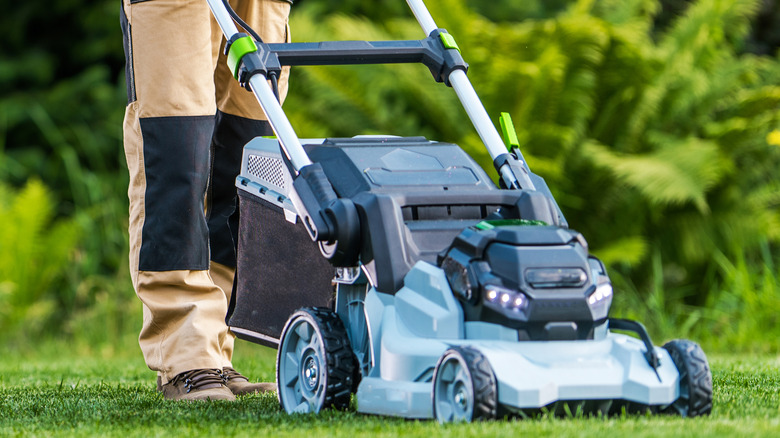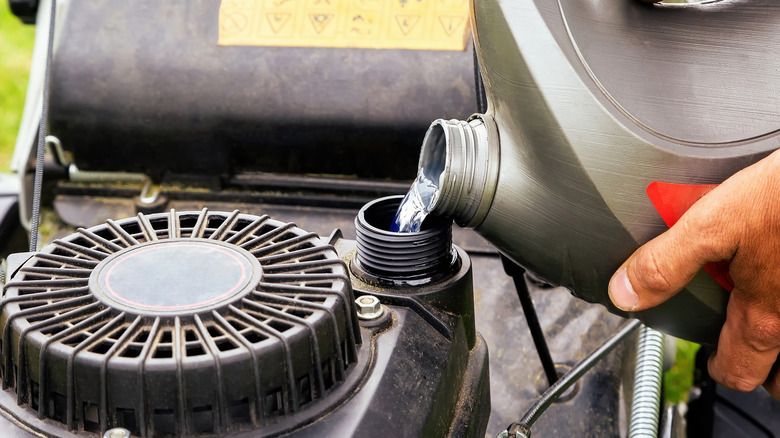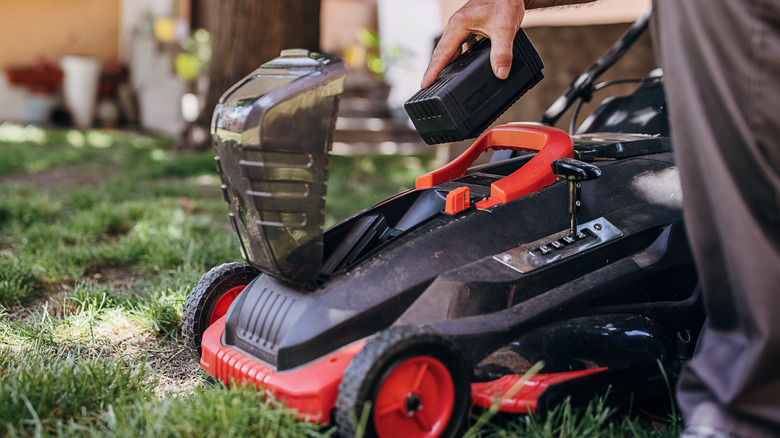Are Electric Lawn Mowers And Yard Tools Really Better Than Gas?
An evolution of technology doesn't just mean flying cars or smarter phones. Every aspect of our lives is touched by progress, from the biggest, heaviest machines, to the humble implements of weekly lawn care. Once upon a time, if you wanted to cut the grass in your yard, you'd bust out the gas-powered lawn mower, revving it up and breathing in fumes for an hour or so.
Nowadays, though, while there are still plenty of gas-powered tools on the market, there are just as many tools powered by internal batteries, as fossil fuel usage falls out of vogue in an effort to be more environmentally conscious.
The potentially-million-dollar question then becomes: Is sticking with the gas-powered classics the best way to care for your lawn and yard? Or will making way for the battery-powered future be better for your greenery in the long run? It's all about weighing the pros and cons; the perks to the old ways, versus the improvements of the new wave.
The perks of combustion
While the usage of traditional fuels isn't as popular these days as it used to be, there is a reason that gas-powered lawn mowers and yard tools are still readily available: Power. Combustion engines are the original powerhouse, after all, delivering a raw power output that's still pretty hard for battery-powered devices to match.
If your lawn is covered in stubborn, overgrown greenery, a gas-powered mower will chop it right up. It also helps that, when it's time to power up a tool comes along, it's as simple as dumping fuel into an intake — as opposed to messing around with batteries and chargers.
Since gas-powered tools were the universal standard for so many years, their construction has also been long-since streamlined. As a result of this, gas-powered tools are generally a bit cheaper than their modern electrical counterparts, at least upfront. This also applies to replacement parts, though that does come with the assumption that you'll need to use those replacement parts at some point.
The improvements of electricity
What electric lawn mowers and yard tools lack in a combustion engine's raw power output, they more than make up for in efficiency. For one thing, due to the lack of said combustion engine, electric tools are markedly quieter in operation than gas-powered tools.
Obviously, a lawn mower or leaf blower is going to make a decent amount of noise either way, but it's a difference between "slightly loud" and "absolutely earsplitting." The simpler components of battery-powered tools also make them generally lighter, making them much easier to lift and maneuver, which in turn reduces the physical strain on you, the user.
Since electric tools are the wave of the future, newer and better models — up to and including robotic mowers — are coming out all the time. This means every new product is gradually improving upon an existing framework. As a result of this, battery-powered tools are less susceptible to sudden failures, necessitating less maintenance and replacement parts. If your electric tool does break down, it'd theoretically be a much rarer occurrence.
Which is better?
If you have the space and money for it, it may be prudent to keep tools of both gas-powered and electric varieties on hand, switching as the situation (or work that the tool caters to) demands it. Of course, not everyone can manage that, so it makes sense to have to pick between them.
If you have a lot of lawn to care for and don't mind the smell of gas, you can stick with your old mower for the time being. However, if you're looking for yard care tools that could be considered an investment in the future, it may be better to get on the battery bandwagon sooner rather than later.
As efforts continue to phase out fossil fuels, gas-powered mowers and tools will eventually become obsolete, which will make using and caring for them harder. While battery-powered tools may not be as overtly powerful as a combustion engine now, they'll almost definitely reach that point some day.
If you couple that promise of power with the current benefits, including quieter operation, reduced physical strain, and overall easier care, electric definitely wins out. If nothing else, it may be prudent to get used to electric tools now in case they become the only option later. That said, innovation can only improve the quality of electric tools as time goes on, so any future electric tools you get will potentially be better than the last.



